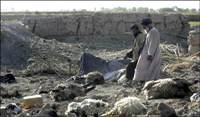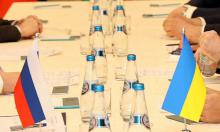U.S. Afghan operation resulting in civilians' deaths cause stir in NATO
Three recent U.S. special forces operations that killed at least 90 Afghan civilians have caused friction with America's NATO partners.

The deaths involved troops from a 12,000-member U.S.-led coalition, which operates separately from NATO's 37,000-strong International Security Assistance Force. But NATO officials fear that Afghans and others don't understand the distinction.
Mounting civilian casualties have already dented support for the international mission, sparking angry demonstrations and a warning from President Hamid Karzai that Afghans can accept the deaths no longer.
German Defense Minister Franz Josef Jung said on Wednesday that the recent operations by U.S.-led troops exposed the need for restraint.
"We have to do everything to avoid that civilians are affected," Jung said on Germany's ZDF television. "We are in talks with our American friends about this."
Insurgency-related violence has spiked in 2007, with more than 1,800 people killed, according to an Associated Press count based on U.S., NATO and Afghan reports.
They include about 135 civilians killed by U.S. or NATO action, a figure that also could undermine support in Western countries, especially in Europe, for the faraway deployment. About 135 civilians have also been killed by Taliban suicide bombs and attacks.
NATO's counterinsurgency strategy focuses on separating fighters from the general population and strengthening the Afghan government. The U.S.-led coalition's counterterrorism mission involves taking out al-Qaida or Taliban leaders and cells of skilled fighters.
While troops from the two missions communicate often and at times work together, they operate under different command structures and don't always coordinate their actions.
Reports of killing Taliban militants are often received badly in European capitals where officials want to sell the mission as reconstruction and development, not just military might.
U.S. special operations have created "a fallout that is negative because the collateral damage and particularly the civilian casualties are seen as unduly high, certainly by the Afghan people. This is of concern to us," said Daan Everts, the senior NATO civilian in Afghanistan.
Everts said there is not a "complete disconnect" between the coalition and ISAF, but that there is "room for more coordination and consultation that would prevent possible mishaps."
NATO Secretary General Jaap de Hoop Scheffer alluded to possible fissures in the 26-member alliance during a news conference with U.S. President George W. Bush in Texas on Monday, saying Afghanistan is a front line in the fight against terrorism "that should not become a fault line."
Bush noted the Taliban "likes to surround themselves with innocent civilians."
"Obviously, to the extent that the United States is working with our NATO allies in combat, we care deeply about protecting innocent life," Bush said. "And to those who Afghans who have lost innocent civilians we grieve with you."
Lt. Col. Matthew McLaughlin, spokesman for U.S. Central Command, in Tampa, Fla., which oversees U.S. special forces, said, "We take every precaution to avoid civilian casualties, but understand in this complex environment, facing an enemy with no regard for civilian life, unfortunately civilian losses are sustained."
Airstrikes called in by U.S. Special Forces fighting some 200 Taliban militants near Sangin in southern Afghanistan this month killed 21 civilians, Afghan officials said. Fighting late last month killed some 50 civilians in the western province of Herat, according to Afghan and U.N. officials. In March, U.S. Marines fired on civilians after a suicide attack in eastern Afghanistan, killing 19.
Everts said the U.S. operations can be "quite defensible," but that by not quickly sharing accurate information, false perceptions can emerge. In the wake of the fighting in Herat, the coalition said it had killed 136 militants. But reports soon emerged of dozens of civilian dead.
Everts said officials in Kabul and Brussels were exploring ways to more closely involve Afghan forces to help reduce civilian casualties a long-standing demand from Karzai. He said he wholly supports the "Afghanization" of the international mission, a term used to mean transferring security duties increasingly to Afghan soldiers and police.
"It still has to be worked out, but it's moving in that direction," Everts said.
Subscribe to Pravda.Ru Telegram channel, Facebook, RSS!




